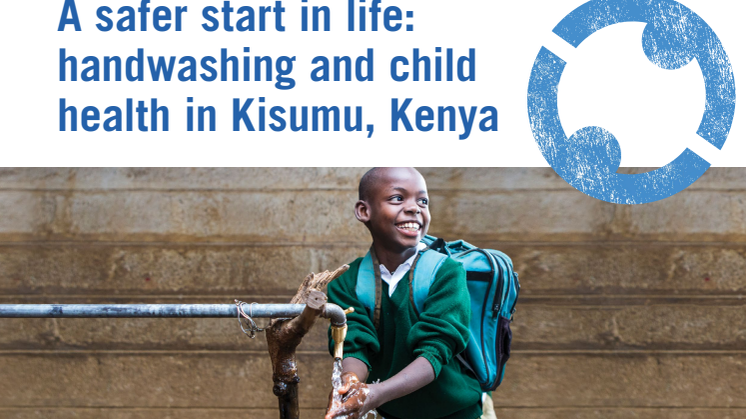News -
Report highlights ineffective response to leading cause of child mortality
A global lack of investment in handwashing to combat malnutrition, stunting and a leading cause of death in children under 5 has been condemned in a new report.
Author Dr Lucy Stevens highlighted research from the last 3 or 4 years showing a link between multiple bouts of diarrhoea and other faecally-transmitted infections in childhood and the ability of the body to absorb nutrients from food in the long term.
This causes malnutrition, stunting and permanent damage to children, severely limiting their long-term opportunities, health and life expectancy, leading to reduced or impaired physical and cognitive development.
Dr Stevens said: “There is a simple solution; improving handwashing practices has been proven to cut the incidence of diseases like diarrhoea by nearly half.
“It requires changes in attitudes and behaviour, yet a lack of funding means although handwashing is one of the most cost-effective public health interventions, it is woefully under-resourced.”
The findings, released by international development agency Practical Action on World Toilet Day on November 19, will be presented at the launch event of its Safe Pair of Hands Appeal, at the Wellcome Collection in London the following day.
Dr Stevens will use the event to highlight the huge funding gap in promotion of hand washing amongst slum communities in the developing world.
She said: “I will call for more focus on the requirements of the urban poor from donors. Diarrhoea and other illnesses caused by poor handwashing and hygiene practices are responsible for more than half a million deaths of children under 5 every year.”
The appeal, in which all public donations will be matched by the UK Government, will enable Practical Action to galvanise communities in Kisumu, Kenya, improve their environment, sanitation and educate people on the link between diarrhoea and malnutrition and the significance of hygiene and handwashing.
Practical Action will work with communities to design and construct hand washing stations at their homes, educate carers of children on proper practices as well as improve the supply of clean water to rehabilitate water pipelines and install 2,500 water points.
The appeal will transform the lives of people living in slums in of Kisumu. Every pound donated by the public will be matched by the UK Government, up to a maximum of £5m.
You can download Dr Stevens' report here.
Key Facts:
- •Diarrhoea is the second leading cause of death, after pneumonia, in children under 5 years old, killing around 525,000 children under five every year.
- •New research has shown links between multiple bouts of diarrhoea in childhood and the ability of the body to absorb nutrients from food in the long term.
- •There is a lack of investment in handwashing campaigns: 80% of countries say they have insufficient funding to meet national water and sanitation targets.
- •48% of all incidences of diarrhoeal disease can be avoided simply through improved handwashing at critical times.
Notes to Editors
About UK Aid Match
- •The UK Aid Match scheme is run by the Department for International Development, and brings charities, the British public and the UK government together to collectively change the lives of some of the world’s poorest and most vulnerable people. For every £1 donated to a selected charity appeal, the government will also contribute £1 of UK aid to enable the charity to go further in changing and saving lives, up to a total of £5 million per appeal.
- •Organisations must be UK-based, non-governmental and not-for-profit and be running an appeal set to raise at least £100,000, within a 3 month appeal period. Donations must be from people (not businesses) living in the UK and go towards an eligible international development project. For further information and guidance, please visit www.gov.uk/uk-aid-match.
About Practical Action
Practical Action uses technology to challenge poverty in more than 40 developing countries in Latin America, Africa and Asia.
Our strength is our approach. We do not prescribe a solution. Instead, we find out what people are doing and help them to do it better. Through technology we enable people to build on their skills and knowledge to produce sustainable and practical solutions. Thus transforming their lives forever, protecting the world around them and helping them break out of the cycle of poverty for good.
Last year we helped 2.8 million people transform their lives by helping them access modern energy, clean water and sanitation better farming or employment or by helping them keep safe from disasters.
But this is not all. You can read a full report of Practical Action’s latest activities here.
Practical Action has been working with poor communities around the globe since being set up 50 years ago by the economist and philosopher EF Schumacher. Schumacher wrote the revolutionary book, Small is Beautiful and believed in putting people’s real needs at the heart of development. That is the guiding principle that informs everything we do today. We believe that the right idea, however small, can change lives.
For more information about Practical Action, log on to www.practicalaction.org
Topics
- Diseases
Categories
- world toilet day
- slums
- malnutrition
- poverty
- practical action
- health
- washing
- stunting
- kenya

